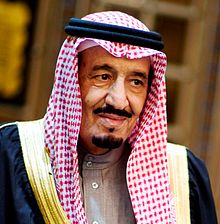 Trump’s ‘Largest Arms-sale Deal in US history’ Blocks Relief for Starving Yemenis
Trump’s ‘Largest Arms-sale Deal in US history’ Blocks Relief for Starving Yemenis
Donald Trump flew away from Washington to Saudi Arabia yesterday, and the worries flutter through the news. Will he sleep well enough not to be cross? Will his speech, written by known anti-Moslem speechwriter Stephen Miller, insult Moslems? Will the investigation into Russia-ties in his administration interfere with the negotiations?
But the biggest worry may not be getting any attention at all.
Mark Pocan, Democratic Representative from Wisconsin, wrote in the Washington Post on Friday that “Trump is revealing to the world a dark side to his boasts of creating jobs: He may be helping to create a famine as well. . . .
Along with the President’s plane-full of staff members, including Steve Bannon and Stephen Miller, and presidential family members Ivanka and Jared Kushner and Melania Trump, “the chief executives of JPMorgan Chase, Citigroup, Dow Chemical and Blackstone have followed Trump to the Saudi kingdom, which is using U.S.-made planes and bombs to enforce a blockade of food and aid on its neighbor, Yemen, the poorest country in the region.
Last month, United Nations Secretary General António Guterres implored the world to ensure “the rapid and unimpeded passage of humanitarian aid by air, sea and land” into the country to alleviate the suffering of 17 million food-insecure Yemenis caught in “the world’s largest hunger crisis,” which is “man-made” and is starving and crippling “an entire generation.” Yet Guterres’s plea appears to be falling on deaf ears in Saudi Arabia.
Chris Murphy (D-Conn.) maintained this week, “the Saudis are deliberately trying to create a famine inside Yemen in order to essentially starve the Yemenis to the negotiating table” — and “the United States is participating.”
Pocan argues that Trump has the power to negotiate terms for these arms. “With a hundred billion dollars’ worth of U.S. planes, ships and precision-guided munitions on the line, Trump could simply demand that the Saudis end the blockade, refrain from bombing Yemen’s major port and enter into a U.N.-brokered political settlement in exchange for the U.S.-made weapons.
“Trump has an opportunity to save millions of innocent lives — this may be the most consequential deal he has ever negotiated — and there’s every reason to worry that he’ll botch it by handing away billions of dollars in arms without extracting any concessions from the Saudis, who are using U.S. planes to drop U.S. bombs, with U.S. pilots refueling them in midair and providing them with targeting assistance. This has become a U.S. war with no end in sight, a war that has never been publicly debated or congressionally authorized and that has nothing to do with fighting al-Qaeda — on the contrary, this war is strengthening al-Qaeda.”
This is a profound tragedy in the making. And most of us know nothing about it. The news has not been covering the Saudi/Yemeni armed conflict, nor the use of American made weapons and support troops that are making this undeclared war possible.
Much is being said, by both Democrats and Republicans, about our need to stay focused on other things than the firing of James Comey and the special prosecutor’s investigation into Trump’s alleged Russian ties.
At times, this sounds to me like avoidance, or at least minimizing, of the seriousness of these issues.
But reading Rep. Pocan’s article has made me think how much we rely on the media to inform us, and how, when we are left in ignorance, our tax dollars can turn into deals we do not want, wars we will regret, and profits for arms manufacturers who are making the world a worse place for everyone, including Americans, while they are making their own share-holders rich.
The Trump administration has declared that the Obama administration’s focus on human rights is over. And nations who hated being grilled about their prison systems, their press freedoms, and the state of their educational systems, while trying to make business deals, have rejoiced in Trump’s promises to make deal’s based on business, not public virtues.
But the US should not be in the business of quashing small countries in order to make large, immensely wealthy countries more powerful in their regions. “That way”, as Shakespeare said, “madness lies.”
According to Wikipedia, the Saudis began their military intervention into Yemen in 2015, leading a coalition of nine African and Middle East countries, to influence the outcome of the Yemeni Civil War in favor of the government of President Abdrabbuh Mansur Hadi. Code-named Operation Decisive Storm, the intervention initially consisted of a bombing campaign on Houthi Rebels and later saw a naval blockade and the deployment of ground forces into Yemen.
The US and the Saudis claim that Iran is backing the Houthi rebels, a claim denied by Iran.
The war has received widespread criticism and had a dramatic worsening effect on the humanitarian situation, that reached the level of a “humanitarian disaster” or “humanitarian catastrophe”.
Human rights groups (including Doctors Without Borders) repeatedly blamed the Saudi-led military coalition for killing civilians and destroying health centers and other infrastructure with airstrikes. The de facto blockade left 78% (20 million) of the Yemeni population in urgent need of food, water and medical aid.
So all of this is part of Trump’s visit to Saudi Arabia today, and the fact that he has brought with him the heads of corporations hoping to make huge profits from the sale of arms there, is not reassuring.
As of 10 December, according to Wikipedia, more than 2,500,000 people had been internally displaced by the fighting. Many countries evacuated more than 23,000 foreign citizens from Yemen. More than 1,000,000 people have fled Yemen.
If UN Ambassador Nikki Haley were part of this trip, or if she were asked to negotiate with the Saudi Ambassador to the UN for some relief of the suffering of the Yemenis, Trump’s trip would be less worrisome to me, and to many, like Representative Pocan.
Would this be merely window dressing? A cynic might say yes. But in the end, it is always diplomacy that makes peace possible, it is always diplomacy that makes justice possible. The mighty sword cannot stop the hate that fuels Al Qaeda. Food, water, and a cessation of hostilities, surely can.
This is the deal the President of the United States needs to make, to make this country’s citizens proud again.
___________________________________________________________________________________
Image: Salman bin Abdulli Azi of Saudi Arabia, 2013, Wikipedia.com










